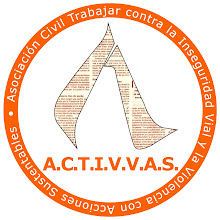ACTIVVAS submits its seven-point proposal for the Decade of Action for Road
Safety. It proposes measures at inter-American level that will help to achieve one
of the goals set out by the United Nations General Assembly in its resolution A/RES/64/255 of 10 May 2010, which is to "stabilize and then reduce the
forecast level of road traffic fatalities around the world..."
(1) Secure the participation of various public
bodies so that road safety is universally considered a matter of public health.
Our societies have seen an exponential increase in
alcohol consumption among young people. There is, however, a lack of
comprehensive health plans that warn against the excessive consumption of alcohol.
(2) Urge public bodies to coordinate road safety
policies with due regard for social equity.
In our
societies, the most vulnerable persons on public roads frequently belong to
disadvantaged, low-income groups. Such persons are over-represented among
pedestrians hit by cars, buses and trucks. As victims, however, they have scant
influence over political decisions and little or no access to the media to make
their voices heard. They are often unable, in particular, to bring their cases before
courts of law.
(3) Incorporate gender equality into public
road safety programmes
In our societies, street and road use in general
reflects not only a marked social difference, but also gender inequality. Women
have a different relationship to roads, given that they much more frequently
circulate on foot with children or elderly persons who depend on them for their
safety.
(4) Secure the effective participation of
national judicial systems under the slogan: WITHOUT JUSTICE THERE CAN BE NO
SUSTAINABLE PREVENTION OF DEATH ON THE ROADS.
It is important to link the high rates of road
violence in our societies to the absence of controls and of severe and inescapable
judicial penalties.
(5) Achieve concrete, productive coordination in
following up all road safety measures taken in various spheres (Ministries of
the Interior, Justice, Health, Public Works, etc.)
In our societies, non-communication and a lack of
administrative and political coordination impair the effectiveness and
credibility of the efforts undertaken.
It is it accordingly necessary to ensure the
participation of the various responsible ministries, including those of the
Interior, Justice, Health and Public Works, with a view to strengthening the
links between road safety and technological development.
(6) Secure the clear and unambiguous
participation of the public authorities in the dissemination of an appropriate
and expressive message concerning the scourge of road violence.
Highlight the slogan: Road safety is no accident. Eliminate the word "accident",
widely used in our societies, and replace it by "Road or traffic
homicides, collisions, crashes and death by road vehicles".
(7) Urge public bodies to promote and updated
human rights agendas that would include road safety.
It is imperative to draw the attention of all
segments of society to the unique and irreplaceable value of the human lives
that are lost through road violence, a scourge that has become a global
pandemic.
The scale of the problem calls for firm measures
that guarantee respect for the right to road safety as a fundamental human
right.

